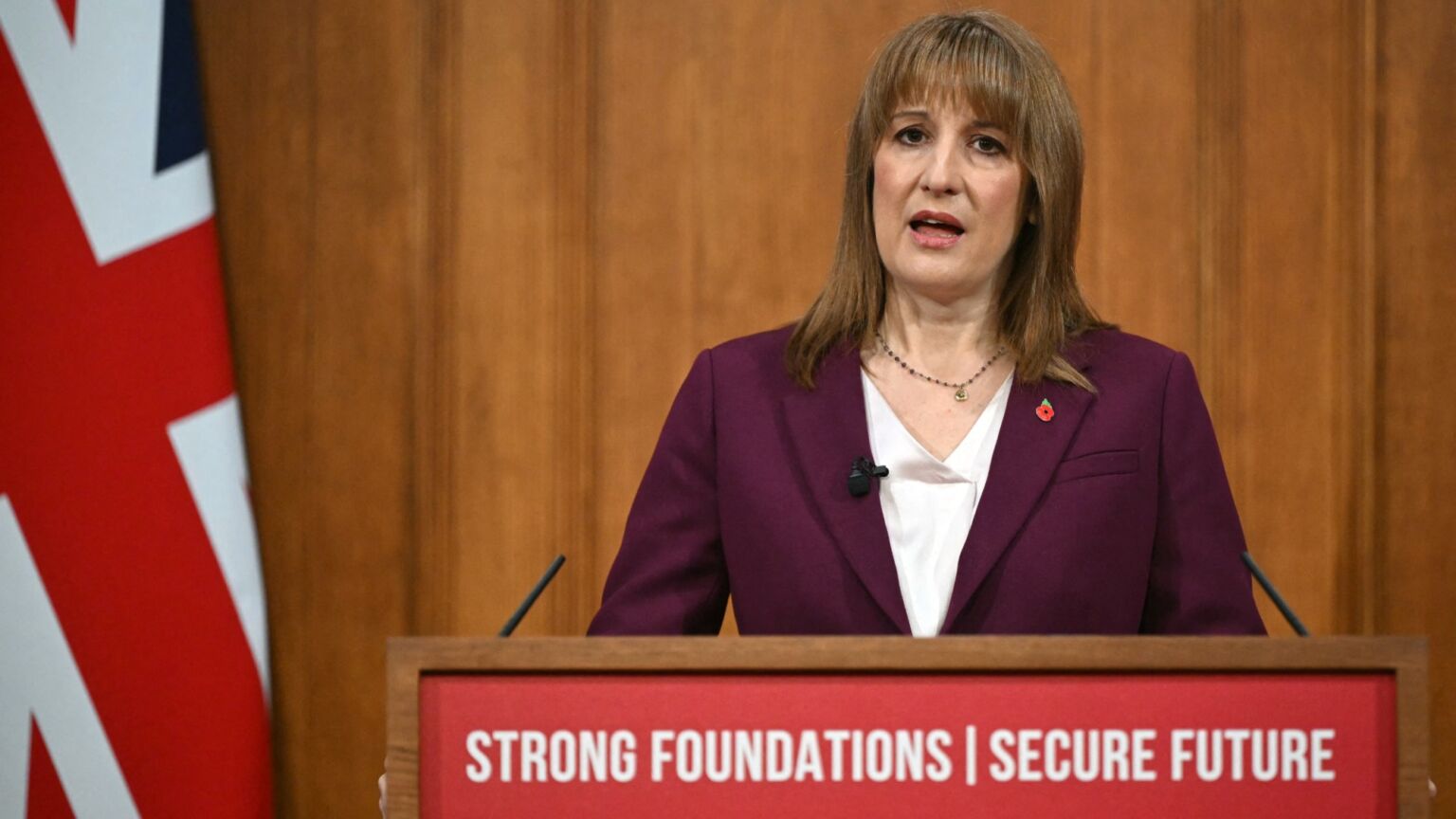Rachel Reeves has no answer to Britain’s financial mess
While Labour flip-flops on income-tax rises, the economic situation is worsening.

Want unlimited, ad-free access? Become a spiked supporter.
The UK’s deluded chancellor has outdone herself this time. Rachel Reeves had spent much of the past month suggesting that it would be necessary to raise income-tax rates in the next budget, due on 26 November. As is her wont, she came up with a set of excuses to justify a move that would contradict her statement to the Treasury Select Committee last autumn – that ‘we are not going to be coming back with more tax increases or, indeed, with more borrowing’. A move that would also break a key Labour manifesto promise not to raise income tax.
Our intrepid chancellor even claimed to have made a ‘discovery’ that made a tax hike inevitable – namely, Britain’s long-recognised productivity crisis. She blamed Britain’s financial woes on ‘the long-term impact of Tory austerity, [the Tories’] botched Brexit deal and the pandemic’. All events that long preceded the 2024 election campaign. What is she going to blame next: Margaret Thatcher’s premiership? The Great Smog of London in 1952?
But now Reeves has u-turned on her u-turn. Having spent weeks suggesting the dire state of the public finances necessitated tax rises, she has now changed her mind. There will now be no increase in income-tax rates. According to reports, Reeves was told by the God-like Office for Budget Responsibility this week that the government’s financial shortfall will be not quite as large as first forecasted – closer to £20 billion than £30 billion. This ‘good news’ apparently allowed Reeves to back down on tax rises. There’s little doubt that political expediency also played a significant role in this u-turn on a u-turn. Both Reeves and especially the embattled prime minister, Keir Starmer, were rightly worried that a tax hike would go down terribly with voters, and cost angry Labour MPs at the ballot box.
The chaos and incompetence of this government are almost beyond compare. One week it’s insisting that income-tax rises are necessary, the next it’s saying they’re not. It seems to have absolutely no idea how to tackle Britain’s profound economic challenges. So let’s imagine an alternative approach: a new government is elected next week, with a mandate to fix things. What sort of budget could it come up with in the interests of the country?
Such a government would already know the bad news – that there is a huge hole in the public finances, with economists putting it at between £20 billion and £30 billion. It knows that growth is the UK’s top economic need, but that it will take some time to remove the barriers to investment and productivity. It knows it must address the damaging consequences of past governments spending way more than tax revenues. It knows that this has generated a national debt whose interest bill is sitting at £110 billion a year, and that this eats up nearly one in every £10 of government spending.
The new chancellor explains to the public that this is a dead end. It is irresponsible to borrow more or to impose further taxes, which are already the highest since the late 1940s.
Instead, this new enlightened administration comes up with the entirely common-sense plan: stop spending so much. Under the maxim that when you are in a hole, you can at least stop digging, its goal would be to prevent non-essential public spending from rising further. Three imperatives guide its efforts.
First, it would prioritise the state’s three core functions: defence, law and order, and the provision of essential public goods. The latter emphasises science and basic research, a welfare safety net, transport, energy and water infrastructure, fundamental health and social care, and schooling to age 16.
Second, it would maintain investment spending on the priority areas on the assumption that this will create assets for social benefit. After the budget, this assumption would be tested through a full review of investment plans.
And third – pending a post-budget line-by-line review of current spending – it would freeze in real, post-inflation terms as much day-to-day public spending as possible. The rationale is that, given the country is able to cope with spending at the 2025 level, the government could start to close the deficit by not spending more in real terms next year. To emphasise, these are not cuts in existing spending – which can begin gradually after the budget – but the elimination of planned increases.
As this fictional government team gets to work, there’s a knock at the door. It’s someone from the Office for Budget Responsibility (OBR), with a projection of what the public finances might look like in five years’ time. The chancellor replies:
‘That’s a rather pretentious name for a forecasting organisation. Surely, it’s the elected government that is the office with responsibility for the country’s budget. Anyway, thank the OBR and say we are far too busy dealing with the current deficit to contemplate what might be happening five years hence, especially since the things we’ll be doing over the next few months and years will bring about a very different reality by then.’
In light of the government’s core responsibilities, the government team identifies four areas of savings: health, non-school education, welfare and the Net Zero carbon-emissions programme.
Over the past half century, health expenditure in real terms has increased more than fivefold, the fastest growth of any area of public spending. Health is clearly not an area that has been starved of funds. Today’s NHS spending per person is about £3,500 – that’s almost double in real terms what was spent in 2000, even adjusting for the older age composition now.
It is thus legitimate to argue that keeping NHS real spending at 2025 real levels in 2026 is credible. To ease the challenge, note that healthcare productivity is still nearly eight per cent lower than it was in 2019. Although it is difficult to measure public-sector productivity precisely, the stats imply additional health spending has not been producing proportionate benefits for patients. Time for the NHS to focus on better ways of working, rather than on spending even more money unproductively.
A freeze at 2025 levels saves about £9 billion of planned increases for NHS England, and about a further one-fifth in the other three countries, increasing the UK-wide NHS savings to about £11 billion. Following the same principle, halting the planned increase in non-school education budgets next year would save another £2 billion.
Welfare accounts for over a quarter of all current government spending. It is the equivalent of 11 per cent of the UK’s annual output. That one in every 10 pounds of new value produced is spent in this way shows the system has gone well beyond a safety net in times of difficulty.
If the country was in a deep recession, and joblessness was soaring, freezing non-pension welfare spending might be a tougher order. But we know the economy is flatlining, not cratering, and the employment rate has been pretty flat, too. This implies that keeping real spending at this year’s level is achievable with the right leadership and determination. This saves the planned increase of roughly £8 billion.
Stopping the non-pensioner welfare bill expanding any further would not necessitate cutting anyone’s existing benefits. A real-terms freeze could be achieved by introducing a ‘one-on, one-off’ practice that keeps the number of beneficiaries stable, helped by tightening immediately the eligibility criteria for new sickness, disability and other non-pensioner benefits. This public-service discipline would prioritise those who really need support. It would incentivise benefits and job-centre staff to move existing claimants out of the system, and into work, education or training.
This approach would be popular among most people, with the exception of daydreaming Labour backbenchers. Even without an extensive debate, there is widespread public scepticism about the legitimacy of the one-third increase in the number of working-age people on health-related benefits in just the past five years. The number of these claimants has expanded to cover one in every 10 working-age adults. The notion that this is caused by such a deterioration in people’s health beggars belief, especially when so many of the new claimants are young.
Net Zero spending falls outside the core state functions, and has never had a democratic mandate. This expenditure should be cut fully, with the bonus of removing one of the government’s self-imposed barriers to economic growth. This would produce an annual saving of £10 billion pounds from the capital budget, which would help reduce additional borrowing for public investment. It would also reduce current expenditure by £2 billion next year.
Note that this wouldn’t prevent any business in Britain – domestic or foreign – from investing in or adopting low-carbon technologies, if they so decide. What it would stop is workers, capital and other resources being drawn into uncommercial activities because of Net Zero directives. Nor would it detract from overdue public investment in nuclear power, which is budgeted separately.
Alone, with no new taxes, these four reductions from next year’s planned spending would save £23 billion ahead of next year. This leaves other big areas of spending to be reviewed and adjusted in the year before the next autumn budget – not least the state pension system, public-sector pension schemes, the schools budget and the proliferation of undemocratic quangos.
Taking this approach would mark an end to the fantasy practised by successive governments of forever being able to spend beyond the country’s means. This isn’t only about avoiding the inevitable doom-loop consequences of persistent profligacy. It is also a blow against the culture of entitlement promoted by successive administrations that has proved so damaging to the cohesion of society, as well as to the economy.
We can fix the economic mess we find ourselves in. We simply need a government prepared to make tough, but necessary, decisions. That government is not the chaotic and clueless administration of Starmer and Reeves.
Phil Mullan’s Beyond Confrontation: Globalists, Nationalists and Their Discontents is published by Emerald Publishing. Order it from Amazon (UK)
You’ve hit your monthly free article limit.
Support spiked and get unlimited access.
Support spiked and get unlimited access
spiked is funded by readers like you. Only 0.1% of regular readers currently support us. If just 1% did, we could grow our team and step up the fight for free speech and democracy.
Become a spiked supporter and enjoy unlimited, ad-free access, bonus content and exclusive events – while helping to keep independent journalism alive.
Monthly support makes the biggest difference. Thank you.









Comments
Want to join the conversation?
Only spiked supporters and patrons, who donate regularly to us, can comment on our articles.